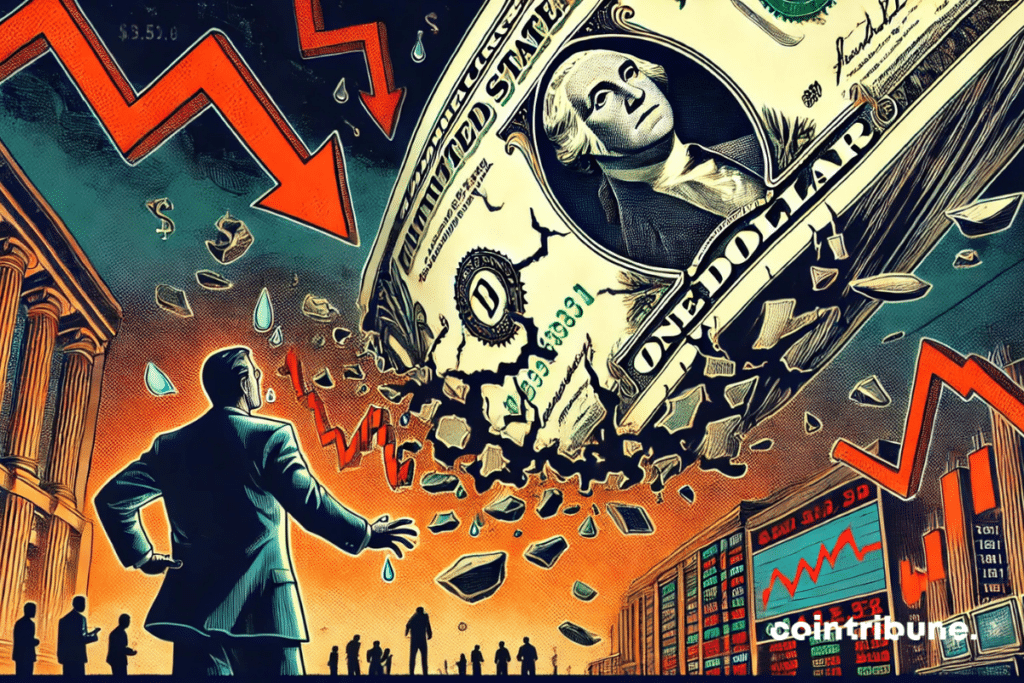Is The Dollar’s Dominance At Risk ? Deutsche Bank Sounds Alarm
The dominance of the US dollar in international trade and global reserves has never been more questioned. Indeed, Deutsche Bank has sounded the alarm on a growing phenomenon: dedollarization among US allies. In the face of geopolitical tensions and financial sanctions, several nations are seeking to reduce their dependence on the greenback. If this trend accelerates, the impact could be considerable, disrupting the global monetary balance and redefining power dynamics within the international financial system.

Growing Tensions Around the Greenback
Deutsche Bank warns of a phenomenon that is accelerating. Numerous countries allied with the United States are reducing their dependence on the dollar for their trade transactions and foreign exchange reserves.
According to the bank, this dynamic is particularly fueled by the rise of economic and geopolitical tensions. “The pressures exerted by US sanctions and uncertainties around monetary policy are prompting many countries to seek alternatives to the dollar,” explains a report from the financial institution.
Major players in international trade, such as China, Russia, and some Gulf states, have already begun to shift towards other currencies, notably the yuan and the euro.
Recent tensions with Washington and the fear of the dollar being used as a tool of diplomatic pressure are accelerating this transition. Some countries are seeking to secure their exchanges and sign agreements for payments in local currencies to thereby reduce their dependence on fluctuations of the greenback.
The Gradual Erosion of the Dollar’s Role
Historically, the dollar has dominated the global financial system thanks to several advantages:
- Its stability : despite economic fluctuations, the dollar has long been perceived as a safe haven ;
- Its role in global trade : oil transactions and many commodities are still denominated in dollars ;
- The influence of American financial institutions : the power of the US banking network has reinforced the dominance of the greenback.
Yet, several indicators show that this hegemony is weakening. The IMF has reported a gradual decline in the dollar’s share of global reserves, reaching its lowest level in decades. Meanwhile, international transactions in dollars are decreasing, in favor of bilateral agreements in alternative currencies.
This shift does not happen overnight, but the signs of a monetary rebalancing are multiplying. For financial markets, such a evolution could lead to greater exchange rate volatility and a reconsideration of the historical advantages that the dollar enjoyed in international financing.
Alternatives Emerge Against the Dollar : Towards a New Global Monetary Balance ?
With the rise of uncertainties related to the greenback, several initiatives aim to build a more multipolar financial system. China is actively promoting the internationalization of the yuan, notably through trade agreements with emerging countries.
Russia, for its part, has turned to transactions in rubles and yuan for its raw material exports.
Other countries, particularly in Asia and Latin America, are strengthening their exchanges in local currencies to avoid passing through the dollar for their transactions.
This evolution is also observed in the commodities sector, where some oil contracts are now denominated in yuan. The objective is clear: to limit exposure to fluctuations of the greenback and reduce the grip of the American financial system on the global economy.
In this context of monetary recomposition, cryptocurrencies could find their place. Bitcoin, often considered an alternative store of value, benefits from the growing mistrust towards traditional fiat currencies. Some nations are also exploring the potential of central bank digital currencies (CBDCs) as a means to bypass the dollar.
However, the rise of cryptocurrencies in this new environment will depend on several factors: institutional adoption, regulation, and investor confidence.
If dedollarization continues, it could reinforce the role of cryptocurrencies as a decentralized global exchange solution, competing with traditional currencies.
The warning from Deutsche Bank highlights a phenomenon that could reshape the contours of the international monetary system. If dedollarization accelerates, the world could shift towards a more fragmented model, where multiple currencies share global economic dominance. In this context, financial market participants and investors must anticipate the repercussions of a world where the dollar is no longer the uncontested king.
Maximize your Cointribune experience with our "Read to Earn" program! For every article you read, earn points and access exclusive rewards. Sign up now and start earning benefits.
Diplômé de Sciences Po Toulouse et titulaire d'une certification consultant blockchain délivrée par Alyra, j'ai rejoint l'aventure Cointribune en 2019. Convaincu du potentiel de la blockchain pour transformer de nombreux secteurs de l'économie, j'ai pris l'engagement de sensibiliser et d'informer le grand public sur cet écosystème en constante évolution. Mon objectif est de permettre à chacun de mieux comprendre la blockchain et de saisir les opportunités qu'elle offre. Je m'efforce chaque jour de fournir une analyse objective de l'actualité, de décrypter les tendances du marché, de relayer les dernières innovations technologiques et de mettre en perspective les enjeux économiques et sociétaux de cette révolution en marche.
The views, thoughts, and opinions expressed in this article belong solely to the author, and should not be taken as investment advice. Do your own research before taking any investment decisions.